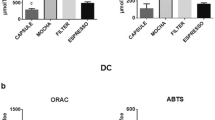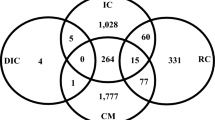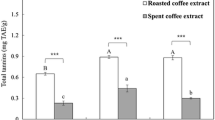Abstract
Although coffee has been reported as a major contributor to antioxidants in the diet, there are limited studies assessing how brewing methods and types of coffee affect antioxidant capacity of coffee consumers. This study was aimed to investigate the impact of coffee preparation on total phenolic content in brewed coffee extracts and their contribution to antioxidant status. We examined how the different brewing methods affect total phenolic content and antioxidant capacity in brewed coffee extracts, then assessed the antioxidant status of coffee consumers after drinking coffee. Results showed that consuming capsule versus French press coffee provides a higher total phenolic content and drinking capsule coffee leads to greater antioxidant status as shown by the higher total antioxidant capacity in urine. Further studies can expand on this by using a broader range of brewing methods to evaluate the contribution of brewing methods of coffee to antioxidant status.


Similar content being viewed by others
References
Bohn SK, Blomhoff R, Paur I. Coffee and cancer risk, epidemiological evidence, and molecular mechanisms. Molecular Nutrition Food Research. 58: 915-930 (2013)
Cao S, Liu L, Yin X, Wang Y, Liu J, Lu Z: Coffee consumption and risk of prostate cancer: A meta-analysis of prospective cohort studies. Carcinogenesis. 35: 256-261 (2014)
Castillo MD, Ames JM, Gordon MH. Effect of roasting on the antioxidant activity of coffee brews. Journal of Agricultural and Food Chemistry. 50: 3698-3703 (2002)
Christen Y. Oxidative stress and Alzheimer disease. The American Journal of Clinical Nutrition. 71: 621S-629S (2000)
Chrysant SG. The impact of coffee consumption on blood pressure, cardiovascular disease and diabetes mellitus. Expert Review of Cardiovascular Therapy. 15: 151-156 (2017)
Ganmaa D, Willett WC, Li TY, Feskanich D, van Dam RM, Lopez-Garcia E, Hunter DJ, Holmes MD. Coffee, tea, caffeine, and risk of breast cancer: A 22-year follow-up. International Journal of Cancer. 122: 2071-2076 (2008)
Garcia KC, Llana-Cornejo D, Husi H. CVD and oxidative stress. Journal of Clinical Medicine. 6: 22 (2017)
Górecki M, Hallmann E. The antioxidant content of coffee and its in vitro activity as an effect of its production method and roasting and brewing time. Antioxidants. 9: 308 (2020)
Grosso G, Stepaniak U, Topor-Madry R, Szafraniec K, Pajak A. Estimated dietary intake and major food sources of polyphenols in the Polish arm of the HAPIEE study. Nutrition. 30: 1398-1403 (2014)
Halliwell B. Antioxidants: The basics – what they are and how to evaluate them. Advances in Pharmacology. 38: 3-20 (1997)
Kim DO, Lee KW, Lee HJ, Lee CY. Vitamin C equivalent antioxidant capacity (VCEAC) of phenolic phytochemicals. Journal of Agricultural and Food Chemistry. 50: 3713-3717 (2002)
Larsson SC, Wolk A. Coffee consumption and risk of liver cancer: A meta-analysis. Gastroenterology. 132: 1740-1745 (2007)
Lee SG, Wang T, Vance TM, Hubert P, Kim DO, Koo SI, Chun OK. Validation of analytical methods for plasma total antioxidant capacity by comparing with urinary 8-isoprostane level. Journal of Microbiology and Biotechnology. 27: 388-394 (2017)
Lee BH, Nam TG, Kim SY, Chun OK, Kim D-O. Estimated daily per capita intakes of phenolics and antioxidants from coffee in the Korean diet. Food Science and Biotechnology. 28: 269-279 (2019)
Lee C. Antioxidant ability of caffeine and its metabolites based on the study of oxygen radical absorbing capacity and inhibition of LDL peroxidation. Clinica Chimica Acta. 295: 141-154 (2000)
Liu H, Hu GH, Wang XC, Huang TB, Xu L, Lai P, Guo ZF, Xu YF. Coffee consumption and prostate cancer risk: A meta-analysis of cohort studies. Nutrition and Cancer. 67: 392-400 (2015)
Loftfield E, Freedman N, Dodd K, Vogtmann E, Xiao Q, Sinha R, Graubard B. Coffee drinking is widespread in the United States, but unusual intake varies by key demographic and lifestyle factors. The Journal of Nutrition. 146: 1762-1768 (2016)
Loftfield E, Rothwell JA, Sinha R, Keski-Rahkonen P, Robinot N, Albanes D, Weinstein SJ, Derkach A, Sampson J, Scalbert A, Freedman. Prospective investigation of serum metabolites, coffee drinking, liver cancer incidence, and liver disease mortality. Journal of the National Cancer Institute. 112: 286-294 (2020)
Ludwig IA, Sanchez L, Caemmerer B, Lothar KW, Peña PD, Cid C. Extraction of coffee antioxidants: Impact of brewing time and method. Food Research International. 48: 57-64 (2012)
Marques SS, Magalhães LM, Tóth IV, Segundo MA. Insights on antioxidant assays for biological samples based on the reduction of copper complexes—the importance of analytical conditions. International Journal of Molecular Sciences. 15: 11387-11402 (2014)
Maritim AC, Sanders RA, Watkins III JB. Diabetes, oxidative stress, and antioxidants: A review. Journal of Biochemical and Molecular Toxicology. 17: 24-38 (2003)
Mena P, Bresciani L, Tassotti M, Rosi A, Martinit D, Antonini M, Dei Cas A, Bonadonna R, Brighenti F, Del Rio D. Effect of different patterns of consumption of coffee and a cocoa-based product containing coffee on the nutrikinetics and urinary excretion of phenolic compounds. The American Journal of Clinical Nutrition. 114: 2107-2118 (2021)
Olechno E, Puścion-Jakubik A, Markiewicz-Żukowska R, Socha K. Impact of brewing methods on total phenolic content (TPC) in various types of coffee. Molecules. 25: 5274 (2020)
Pathy NB, Peeters P, van Gils C, Beulens JWJ, van der Graaf Y, Bueno-de-Mesquita B, Bulgiba A, Uiterwaal. Coffee and tea intake and risk of breast cancer. Epidemiology. 121: 461-467 (2010)
Re R, Pellegrini N, Proteggente A, Pannala A, Yang M, Rice-Evans C. Antioxidant activity applying and improved ABTS radical cation decolorization assay. Free Radical Biology and Medicine. 26: 1231-1237 (1999)
Rodríguez-Artalejo F, López-García E. Coffee consumption and cardiovascular disease: A condensed review of epidemiological evidence and mechanisms. Journal of Agricultural and Food Chemistry. 66: 5257-5263 (2018)
Sacchetti G, Mattia CD, Pittia P, Mastrocola D. Effect of roasting degree, equivalent thermal effect and coffee type on the radical scavenging activity of coffee brews and their phenolic fraction. Journal of Food Engineering. 90: 74-80 (2009)
Sakaki JR, Provatas AA, Perkins C, Chun OK. Urinary excretion of estrogenic chemicals following consumption of capsule coffee and French press coffee: A crossover study. Toxicology Reports. 9: 728-734 (2022)
Samoggia A, Riedel B. Consumers’ perceptions of coffee health benefits and motives for coffee consumption and purchasing. Nutrients. 11: 653 (2019)
Sang LX, Chang B, Li XH, Jiang M. Consumption of coffee associated with reduced risk of liver cancer: A meta-analysis. BMC Gastroenterology. 13 (2013)
Schmit SL, Rennert HS, Rennert G, Gruber SB. Coffee Consumption and the risk of colorectal cancer. Cancer Epidemiology, Biomarkers and Prevention. 25: 634-639 (2016)
Seifred HE, Anderson DE, Fisher EI, Milner JA. A review of the interaction among dietary antioxidants and reactive oxygen species. The Journal of Nutritional Biochemistry. 18: 567-579 (2007)
Sosa V, Moliné T, Somoza R, Paciucci R, Kondoh H, Lleonart ME. Oxidative stress and cancer: An overview. Aging Research Reviews. 12: 376-390
Vicente SJV, Queiroz YS, Gotlieb SL, Torres EA. Stability of phenolic compounds and antioxidant capacity of regular and decaffeinated coffees. Brazilian Archives of Biology and Technology. 57: 110-118 (2014)
Wilson KM, Kasperzyk JL, Rider JR, Kenfield S, van Dam RM, Stampfer MJ, Giovannucci E, Mucci LA. Coffee consumption and prostate cancer risk and progression in the health professional’s follow-up study. Journal of the National Cancer Institute. 103: 876-884 (2011)
Wolska J, Janda K, Jakubczyk K, Syzmkowiak M, Chlubek D, Gutowska I. Levels of antioxidant activity of arabica, robusta, and green coffee beans in according to their brewing methods. Biological Trace Element Research. 179: 327–333 (2017)
Acknowledgements
This work was supported by the National Institute of Environmental Health Sciences (Grant Number 1R03ES027983-01A1) to Dr. Ock K Chun. It was also supported by the University of Connecticut McNair Scholars Program and Summer Undergraduate Research Fund to Briana Nosal.
Author information
Authors and Affiliations
Corresponding author
Ethics declarations
Conflict of interest
The authors declare no conflicts of interest.
Informed consent
All procedures followed were in accordance with the ethical standards of the responsible committee on human experimentation (institutional and national) and with the Helsinki Declaration of 1975, as revised in 2008. Informed consent was obtained from all patients for being included in the study.
Additional information
Publisher's Note
Springer Nature remains neutral with regard to jurisdictional claims in published maps and institutional affiliations.
Rights and permissions
About this article
Cite this article
Nosal, B.M., Sakaki, J.R., Kim, DO. et al. Impact of coffee preparation on total phenolic content in brewed coffee extracts and their contribution to the body’s antioxidant status. Food Sci Biotechnol 31, 1081–1088 (2022). https://doi.org/10.1007/s10068-022-01100-4
Received:
Revised:
Accepted:
Published:
Issue Date:
DOI: https://doi.org/10.1007/s10068-022-01100-4




